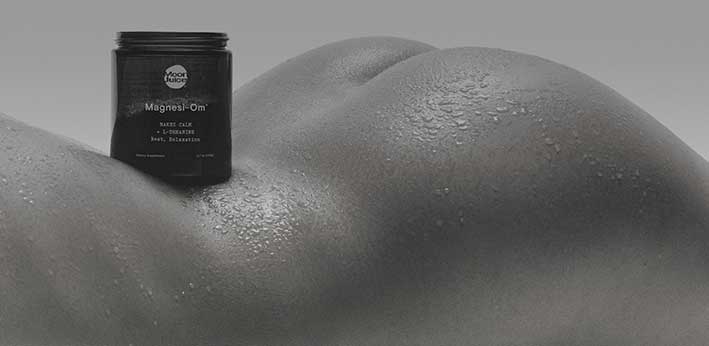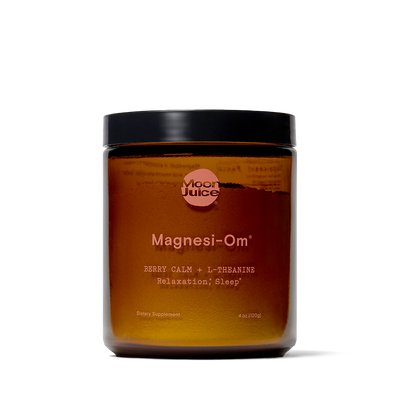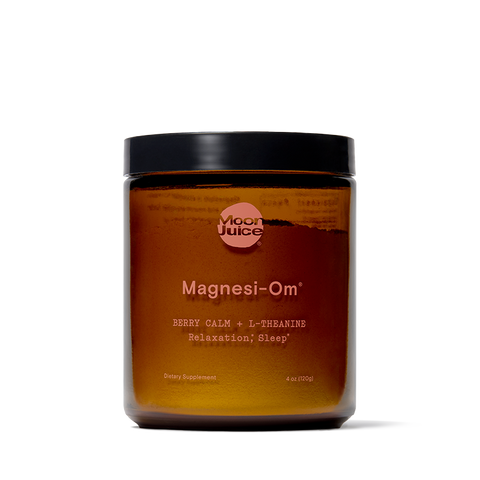Managing headaches can be a daunting challenge, leaving many feeling frustrated with the lack of relief despite trying various remedies. If you're among those prone to headaches and seeking an effective, research-backed approach to prevention, it's time to explore the natural and sustainable solution that Magnesium supplementation offers.
In this article, we’ll explore how harnessing the power of Magnesium can transform your daily life. We’ll uncover its role in headache prevention, its connection to brain health, the best type of dietary Magnesium to consider, and how much you should take to keep those headaches away.
Why is Magnesium Important?
Magnesium is a master mineral that every cell in the body relies on to function. It helps carry out important processes like muscle and nerve operation, blood pressure and blood sugar regulation, and the synthesis of essential components like proteins, bones, and DNA. It’s responsible for over 300 bodily functions — yet surprisingly, over 50% of the population is deficient in it. Beyond physical health, Magnesium supports brain health and overall well-being by helping the body manage stress, reduce headaches, and provide relief from muscle aches and pains.
Does Magnesium Help With Headaches?
Yes. Magnesium isn't just a mineral; it can be your trusted ally in the battle against headaches. The National Headache Foundation has acknowledged the potential of Magnesium in reducing the frequency of headaches, and this support is backed by real-world evidence. Several double-blind, randomized, placebo-controlled trials have further proven Magnesium's ability to provide headache relief, with results showing Magnesium dietary supplements can help to not only reduce the number of headaches but also make them less intense.
But why is Magnesium so important when it comes to headaches? During the body's stress response, it is often pushed out of cells as a protective and regulatory measure. Cells with ample Magnesium concentrations are better equipped to manage the stress response, making Magnesium supplementation a worthwhile option for those aiming to alleviate headache pain and prevent future occurrences.
Are Headaches a Result of Magnesium Deficiency?
Could those pesky headaches really be linked to something as simple as a mineral deficiency? Research says yes! Clinical manifestations of low Magnesium levels or deficiency, known as hypomagnesemia, encompass a range of troubling symptoms that might sound all too familiar to headache sufferers. Warning signs of a Magnesium deficiency include headaches, brain fog, fatigue, weakness, low mood, anxiety, panic attacks, and insomnia.
Studies have also shed light on the link between Magnesium deficiency and various headache types. Research has found that people with cluster headaches or tension headaches have been found to have lower levels of Magnesium in their bodies. In awareness of this, maintaining adequate Magnesium levels in the body is essential to reduce headaches and support brain health.
Scientific studies continue to explore the intricate relationship between Magnesium and different headache types, emphasizing the potential benefits of Magnesium for headache prevention and relief. However, not all dietary Magnesium is created equal, so knowing what types of Magnesium exist and what you should look for in the supplement aisle is crucial.
Which Type of Magnesium is Best for Headaches?
When it comes to Magnesium supplementation, the variety of available forms might leave you wondering which is best for headache prevention and relief. Understanding the differences between these forms can help you make an informed choice.
There are many types of oral Magnesium supplements, including:
- Magnesium Oxide — Often used for constipation and headaches.
- Magnesium Carbonate — Often used for digestive discomfort and heartburn.
- Magnesium Chloride — Often used for muscle aches and pains.
- Magnesium Citrate — Often used to support regularity.
When evaluating Magnesium dietary supplements, it's essential to pay attention to the supplement facts panel on the label. This panel declares the amount of elemental Magnesium in the product (not the weight of the entire Magnesium-containing compound). Why does this matter? Because the absorption of Magnesium can vary depending on its form.
It's worth noting that the body absorbs these different types of Magnesium at varying rates. Forms that readily dissolve in liquid are more completely absorbed in the gut than less soluble forms. However, Magnesium supplements often include other substances, such as amino acids, which can enhance absorption. These additional components not only aid absorption but also provide their own health benefits. To ensure adequate levels to prevent headaches, choose a supplement with various types of Magnesium.
Magnesi-Om® is a natural Magnesium powder supplement that contains 3 bioavailable forms of Magnesium plus L-Theanine for relaxation, sleep, brain health, and regularity.* Magnesi-Om® instantly dissolves in water, making it an easy way to get your daily dose of this vital mineral.
Dietary Sources of Magnesium
Now that you understand the relationship between magnesium and headaches, you might be wondering how to up your intake. While Magnesium supplementation can be a valuable tool for boosting low levels of Magnesium and maintaining a healthy balance of this mineral, it's important to remember that a well-rounded diet also plays an impactful role. Simply taking a Magnesium supplement doesn't mean you should neglect your diet. In fact, a nutrient-rich diet can provide you with natural sources of Magnesium, promoting overall health.
Many foods are naturally abundant in Magnesium, making it easy to incorporate this essential mineral into your diet. Here are some Magnesium-rich food sources to consider if you have low Magnesium levels:
- Leafy Green Vegetables — Spinach and broccoli are excellent choices, offering not only Magnesium but also a wealth of other vitamins and minerals.
- Legumes — Edamame and black beans are not only protein-packed but also high in Magnesium.
- Nuts and Seeds — Pumpkin seeds, chia seeds, and almonds stand out as particularly rich sources of Magnesium.
- Whole Grains — Oats and brown rice are healthy grains that contribute Magnesium to your diet.
- Avocado — This creamy fruit not only adds healthy fat to meals but also provides Magnesium.
- Cacao Powder — A delightful source of Magnesium that can easily be added to smoothies and coffee.
- Fruits — While not as Magnesium-rich as some other foods, fruits like bananas, apples, and carrots still contribute to your daily intake.
Including these Magnesium-rich foods in your diet can increase your levels and promote overall health, providing a well-rounded approach to headache prevention and general wellness.
When Should I Take Magnesium for Headaches?
Wondering if you should take a Magnesium supplement? You may want to explore supplementation options if you are showing symptoms of low Magnesium levels. Determining the best time to take Magnesium supplementation is an important consideration for headache prevention and relief. To harness the full benefits of Magnesium for headache management, consider these timing strategies:
- Supplement Daily — Consistency is key when it comes to Magnesium supplementation. Taking it daily allows your body to gradually replete low levels and access this essential mineral for internal use.
- Evening Routine — Many individuals find it beneficial to take Magnesium before bed. This can promote relaxation, making it easier to unwind and prepare for a restful night's sleep.
- Any Time of Day — If your primary goal is to prevent headaches, taking Magnesium at any time of the day can be effective. You can also opt for microdosing Magnesium throughout the day to maintain stable levels and avoid headaches.
- Immediate Relief — If you sense a headache coming on or find yourself in a stressful situation, consider taking Magnesium in the moment. The body's stress response often pushes Magnesium out of cells, making supplementation beneficial for regulating stress, enhancing relaxation, and reducing headache severity.
- During Menstruation — Magnesium levels fluctuate throughout the menstrual cycle, with levels dropping during the luteal phase. This drop in Magnesium levels can coincide with an increased risk of headaches. Therefore, consider adjusting Magnesium intake during your menstrual cycle to potentially mitigate the risk of headaches.
Incorporating oral Magnesium into your daily routine is a proactive approach to headache prevention. By understanding when and how to take Magnesium, you can tailor your supplementation to your needs, ultimately enhancing its effectiveness in managing headaches.
Sign Up, Nerd Out
Get wellness tips, education, and recipes
delivered straight to your inbox.
Get wellness tips, education,
and recipes delivered
straight to your inbox.
How Much Magnesium Should I Take?
Determining the right dietary Magnesium dosage for your headache prevention and overall health is crucial. The National Institutes of Health offer general recommendations, suggesting an average daily intake of 310–320 mg for women and 400–420 mg for men. These guidelines provide a helpful starting point for maintaining adequate Magnesium levels.
However, adequate does not mean optimal and individual Magnesium needs can vary based on age, gender, activity level, and specific health conditions. To ensure you're taking the appropriate dose, chat with your health practitioner, especially if you have underlying health issues or are on prescription medications. They can offer personalized guidance, confirming there are no contraindications and helping you determine the ideal Magnesium dietary supplement dosage tailored to your unique health profile.
Takeaway
In the pursuit of a headache-free life, consider the remarkable power of oral Magnesium. This essential mineral, often overlooked, can be your natural and sustainable choice for headache prevention. Once you choose to boost your Magnesium intake, the key is understanding this mineral’s importance, selecting the right form, and determining the ideal timing. Once you embrace Magnesium supplementation, you can not only manage headaches but improve cognitive health, manage stress, and increase relaxation.
Sources
- National Institutes of Health, Magnesium https://ods.od.nih.gov/factsheets/Magnesium-Consumer/
- Cleveland Clinic, Signs You May Have a Magnesium Deficiency https://health.clevelandclinic.org/feeling-fatigued-could-it-be-magnesium-deficiency-and-if-so-what-to-do-about-it/
- National Library of Medicine, Magnesium and Stress https://www.ncbi.nlm.nih.gov/books/NBK507250/
- National Library of Medicine, Magnesium in Prevention and Therapy https://pubmed.ncbi.nlm.nih.gov/26404370/
- National Library of Medicine, Magnesium in disease prevention and overall health https://pubmed.ncbi.nlm.nih.gov/23674807/
- National Library of Medicine, Headaches and Magnesium: Mechanisms, Bioavailability, Therapeutic Efficacy and Potential Advantage of Magnesium Pidolate https://www.ncbi.nlm.nih.gov/pmc/articles/PMC7551876/
- National Library of Medicine, Magnesium in Headache https://www.ncbi.nlm.nih.gov/books/NBK507271/
- National Library of Medicine, Magnesium in Headache https://www.ncbi.nlm.nih.gov/books/NBK507271/
- Cleveland Clinic, Magnesium Rich Food sources https://my.clevelandclinic.org/health/articles/15650-magnesium-rich-food














